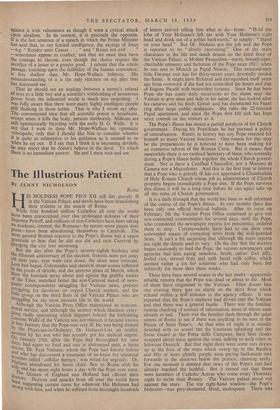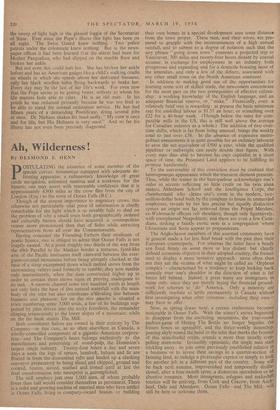The Illustrious Patient
BY JENNY NICHOLSON
Rome
IS HOLINESS POPE PIUS XII still lies gravely ill in the Vatican Palace, and devils have been brandishing their tridents in the streets of Rome.
While four hundred million Catholics all over the world have been, preoccupied over this prolonged sickness of their Supreme Pontiff, and millions of non-Catholics have been taking an academic interest, the Romans—by nature more pagan than Pious—have been abandoning themselves to Carnival. The most general Roman reaction to the Pope's illness was a vague gratitude to him that he did not die and ruin Carnival by plunging the city into mourning. But the day after the Pope's seventy-eighth birthday and the fifteenth anniversary of his election, tridents were put away till next year, eyes were cast down, the skies were overcast. in had begun. Colonnades and classical street-scenes reflected m the pools of drizzle, and the nervous gusts of March, which blow the fountain spray about and agitate the grubby waters of the Tiber, matched better the non-Carnival mood of news- paper correspondents struggling for Vatican news, prelates struggling for decisions on urgent Church matters, and the little group on the third floor of the Vatican Palace who are struggling for the most eminent life in the world. Although the Vatican 'Press Office maintained its noncom- mittal service, and although the secrecy which blankets every-' thing really interesting which happens behind the forbidding canine Wang of the Vatican was not relaxed, it became known ;t1 late January that the Pope-was very ill. He was being treated by the Physician-in-Ordinary, Dr. Galeazzi-Lisi, an oculist, assisted by his son who has recently got his medical degree. yr' January 25th, after the Pope had hiccoughed for nine doctor, had eaten no food and was in abdominal pain, a Swiss rotor, Dr. Paul Niehans, whom the Pope had known before Who has discovered a treatment of ox-brain for intestinal ubles called cellular therapy,' was wired for urgently. Dr. '"„,!ellans abandoned his Swiss clinic, flew to Rome with his wife and has spent eight hours a day with the Pope ever since. doctors. Queens of England and Holland had offered their ors. Doctors and quacks from all over the world have oeen suggesting certain cures for whatever His Holiness had wrong with him, and when he suffered from hiccoughs hundreds of letters arrived telling him what to do—from: "Hold the lobe of Your Holiness's left ear with Your Holiness's right hand and drink out of a goblet backwards," to simply: " Stand on your head." But Dr. Niehaus got the job and the Pope is reported to be " slowly recovering." One of the main characters in the life and death drama on the third floor, of the Vatican Palace, is Mother Pasqualina—nurse, housekeeper, charitable emissary and factotum of the Pope since 1917. when he was sent to Munich as Papal Nuncio. This extraordinary little German nun has for thirty-seven years devotedly tended the flame. It might have flickered and extinguished itself years ago from overwork if she had not controlled the hours and diet of Eugene Pacelli with benevolent tyranny. Since he has been Pope she has made daily excursions to the slums near the Vatican to give alms and help in his name, she has looked after his canaries and his finch, Gretel and has disinfected his Papal ring after large public audiences. She rules the 22-roomed Papal apartment, and since the Pope first fell sick has kept strict control on the visitors to it.
The Pope's illness has meant a partial paralysis of the Church government. During his Pontificate he has pursued a policy of centralisation. Rarely in history has any Pope retained for himself so many Vatican functions. One reason for this may be the preparations he is believed to have been making for an extensive reform of the Roman Curia. But it means that meanwhile there is no cardinal Secretary of State, who normally during a Pope's illness holds together the whole Church govern- ment. Nor is there a CardNal Chancellor, nor a Maestro di Camera nor a Majordomo. And this is the first time in history that a Pope who is gravely ill has not appointed a Chamberlain of Holy Roman Church whose job as administrator of Church property begins immediately a Pope dies. If the Pope survives this, illness it will be a long time before he can again take up all the reins of Church government.
It is a daily triumph that the world has been so well informed of the course of the Pope's illness. In two months there has been only one official medical bulletin. After its issue on, February 5th the Vatican Press Office continued to give out non-committal communiqués for several days, until the Pope, who considered the newspaper reports too pessimistic, ordered them to stop. Correspondents have had to use their own unrevealed means of extracting news from the well-guarded State. It isn't a bit surprising that although the main reports are right the details tend to vary. On the day that the doctors began cautiously to feed the Pope, the various newspapers and agencies had him eating semolina, broth, calves' foot jelly, boiled rice, stewed fruit and milk laced with coffee, which seemed rather a lot for someone who had only been fed indirectly for more than three weeks.
There have been several scares in the last weeks—apparently reliable reports that the Pope was dead or about to die. Most of them have originated in the Vatican. After dinner late one evening there was an alarm on the third floor which echoed within a feud. minutes in the agency offices. It was reported that the Pope's nephews had driven into the Vatican and that there was a general bustle. There was the familiar routine checking of sources of information, most of whom were already in bed. There was the familiar dash through the quiet streets of Rome to see if there was anything to be -seen in the Piazza of Saint Peter's. At that time of night it is usually deserted with no sound but the fountains splashing and the Swiss Guard at the Porta delle Campane, their blue cloaks wrapped about them against the wind, talking to each other in Schwizer Deutsch. But that night there were some cars drawn up at the foot of the steps which sweep up to the Basilica and fifty or more ghostly people were pacing backwards and forwards in the shadows below the portico, chanting eerily. For one moment it seemed that news of the Pope's end had already reached the faithful. But it turned out that these were members of Catholic Action who come every Thursday night to recite their Rosary. The Vatican palace stood out against the stars. The top right-hand window—the Pope's bedroom—was grey-shuttered, blind, uneloquent. There was But not even this could halt her. She has broken her ankle before and has an American gadget like a child's walking cradle on wheels in which she speeds about her dedicated business, Only her black woollen habit, flying backwards to brake her. Every day may be the last of her life's work. For even now that the Pope seems to be getting better, nobody to whom his life matters feels able to relax. He is an old man. In his youth he was ordained privately because he was too frail to be able to stand the normal ordination Service. He has had fifteen years of a demanding Pontificate, doing several jobs at once. Dr. Niehans shakes his head sadly, " My cure is once and for life; but His Holiness is very used." And so far his illness has not even been precisely diagnosed.



































 Previous page
Previous page